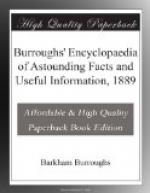[Illustration: Your letter of the 10th instant concerning damaged goods is received, etc.]
The closing paragraph usually begins with such words as Hoping, Trusting, Awaiting, Thanking, or similar expressions, and is complimentary in its tone and designed as a courtesy.
BREVITY.
Business letters should be brief and to the point. The best letter states clearly all the facts in the fewest words. Brevity is not inconsistent with a long letter, as so much may need to be said as to require a long letter, but all repetitions, lengthy statements and multiplication of words should be avoided. Use short sentences, and make every word mean something. Short sentences are more forcible, and more easily understood or remembered, than long drawn out utterances.
STYLE.
Style refers to the tone, air, or manner of expression. Dignity and strength should characterize the style of the business letter. No ornament of expression or eloquence of language is necessary or appropriate in a correspondence between business men. Come to your meaning at once. State the facts. Let every sentence bristle with points.
The successful business man must possess energy, decision, and force, and these qualities should be conspicuous in his correspondence in order to command respect. Never use loose or slang expressions. The business man should be a gentleman. Indulge in no display of superior knowledge or education, but temper each paragraph with respect and deference to others. The learner who would aspire to write a good letter, should, after having finished his attempt, go over each sentence carefully and wherever the pronoun I occurs, modify the expression so as to leave this out.
ORDERING GOODS.
In ordering goods of any kind, care should be used to state very explicitly the color, size, quality, and quantity of the articles desired. If manufactured goods, the name of the manufacturer, or his trade mark or brand should be given. Also state when you desire the goods shipped and in what way. If by freight or express, state what Freight line or Express Company.
SENDING MONEY BY LETTER.
Paper currency should seldom be trusted to pass through the mails, as the liability to loss is too great. Better send draft or P. O. money order, and in every case the amount of the remittance should be stated in the letter, and also whether by draft or otherwise sent. The letter may become important evidence in regard to payment at some future time.
INSTRUCTIONS.
In giving instructions to agents, manufacturers and others, let each order occupy a separate paragraph. State in unmistakable language the instructions desired to be conveyed. If possible a diagram or plan should be enclosed in the letter. Cautions and complaints, if any, should be clearly set forth in paragraphs near the close of the letter.




